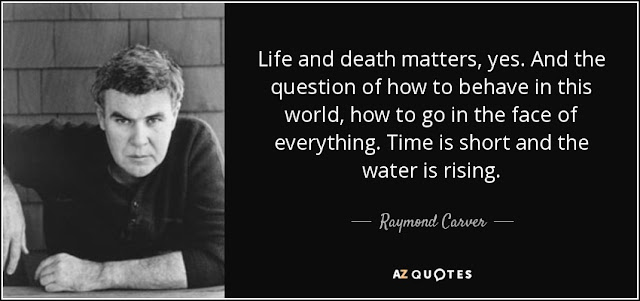Joseph Brodsky: Man in a Suitcase
It's hard to imagine living under a regime that is so threatened by a poet that they confiscate his work, refuse to publish it, arrest him, interrogate him, then charge him with 'social parasitism', unable to contribute to society from his rubbish jobs and role as 'poet'. Joseph Brodsky was deemed 'Anti-Soviet' & thrown into a mental institution; then, after his 'trial', sentenced to 5yrs hard labour. He served 18 months working on a farm before protests made by many other writers, including Jean-Paul Sartre commuted that sentence. The silver lining of his punishment was being given a cottage, without basic amenities, but with enough privacy to spend any free time reading poetry: incl. Donne & Auden; learning English so he could translate Donne, and learning Polish so he could translate Czeslaw Milosz.
When he was finally able to leave his homeland in 1972, he took with him a suitcase, typewriter, and 2 bottles of vodka.
He also took with him a profound respect for language in its own right (why occupying forces often prohibit the use of one's native tongue to enforce that of their oppressor's); and a keen sense of the mechanics of good poetry. He'd met fellow poet Anna Akhmatova in 1963, who encouraged him, and mentored his work.
 Thanks to Auden's help, he left his homeland, and became Writer-in-Residence at Michigan Uni. 2 yrs later he befriended & mentored dissident dancer, Mikhail Baryshnikov, speaking every week until just hours before his death. I had never heard of him, yet even with this brief introduction, love his unique style; hard to describe, but with that certain 'something' that led to his being awarded the Nobel Prize, 1987, and U.S. Poet Laureate in 1991.
Thanks to Auden's help, he left his homeland, and became Writer-in-Residence at Michigan Uni. 2 yrs later he befriended & mentored dissident dancer, Mikhail Baryshnikov, speaking every week until just hours before his death. I had never heard of him, yet even with this brief introduction, love his unique style; hard to describe, but with that certain 'something' that led to his being awarded the Nobel Prize, 1987, and U.S. Poet Laureate in 1991.
Exile: a new chapter in Life; new countries; new jobs; new relationships; leaving past loves, a child, home, the familiar.
I have read the accounts of those who have been imprisoned, or held hostage; had to endure enforced limitations and restrictions. Inevitably one is thrown back on oneself: an Intense examination of life; attitudes; beliefs; misdemeanors; behaviour; foibles. Arduous work, from which there is no real escape, except through madness or death. A poet, by the very nature of his craft, has the means to carry an immense amount of pain & suffering, and process it. Ideally, integrate their shadow-self; transcend their suffering; transmute their grief, and grasp at some measure of hope, or faith. A tall order, but a necessary act of self-redemption and survival.
I do know that Russians are the most patriotic people I have ever met, who love their country fiercely; a part of their soul always remains in their 'homeland'. That ache must feed into the work & even before the loss - the evidence of Passion - for freedom, liberty, respect, hope was enough to get them banged up. He was greatly helped by fellow poet Anna Akhmatova - who had also been imprisoned for her poetry. Mad times. What's new?















Comments
Post a Comment